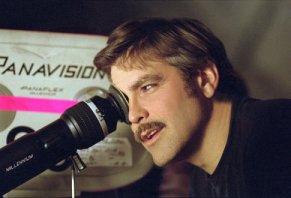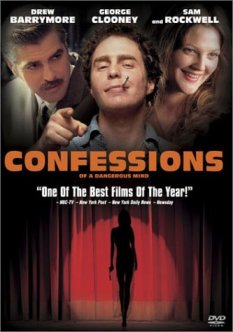|
Confessions
of a Dangerous Mind
Rating:
R
Release Date: September 16, 2003
Approximate running time: 114 minutes
Ten-second Rundown: Game-show creator/host Chuck Barris either
drags down American culture or kills in the service of the
CIA - you decide.
Extras:
Commentary
from Director George Clooney and Cinematographer Newton Thomas
Sigel
Deleted
Scenes with Optional Commentary
Behind
The Scenes Vignettes
Sam Rockwell
Screen Tests
Gong
Show Acts
The Real
Chuck Barris Documentary
Still
Gallery
Tech
Specs: Widescreen anamorphic (2.40:1 ratio), Dolby Digital
5.1 Surround Sound, French Language Track
In watching
the behind-the-scenes extras of Confessions of a Dangerous
Mind, one point gets pounded over and over: George Clooney
is a really nice guy. Of course, that's not enough to warrant
watching a movie, unless the two of you are friends and he
invited you over to his house to watch it. The rest of us
aren't in that boat. However, Clooney also happens to be a
surprisingly capable filmmaker, and his debut feature, while
occasionally unsteady, is an effort that melds artistic concerns
with intriguing storytelling.
The pretty-boy
actor has long been marked by integrity. When Charlie Kaufman's
script, based on Chuck Barris' "Unauthorized Autobiography,"
had been floundering in turnaround, Clooney agreed to take
a minor role in order to give it some studio cachet. For a
while Bryan Singer had intended to direct it. When that fell
through, Clooney realized that if he didn't make it, no one
would. And so he used his friendships in the industry to bring
together some high-powered people for a low cost.
If you
have any familiarity with Kaufman's work, you'd understand
why the studio needed those conditions. The writer tends to
play with reality, as does Barris' book. In it, the man who
created The Dating Game, The Newlywed Game and perhaps
most infamously The Gong Show also claimed to have
killed 32 people as a hitman for the CIA - in between television
productions. Probably a lie, though it sure feeds a lot of
fun conspiracy theories, the story seems a perfect fit for
Kaufman's sensibilities. But few directors get it.
 Clooney
does, giving everything a theatrical stylization that still
has moments of emotional honesty. If nothing in Barris' world
is all that real (and some of the creepier Gong Show
contestants bear that out), who's to say that his power fantasies
are fantasies at all? Clooney
does, giving everything a theatrical stylization that still
has moments of emotional honesty. If nothing in Barris' world
is all that real (and some of the creepier Gong Show
contestants bear that out), who's to say that his power fantasies
are fantasies at all?
In a
telling scene, Barris (Sam Rockwell) finds himself on a soundstage
with sliding backdrops. Each one reflects a different key
moment in his life, but we don't know if those moments really
are memories or confabulations. The point may be that Barris
doesn't know, either.
The film
doesn't seem to want to make up its mind, either. All that's
clear is that Barris doesn't like himself very much. In a
bit borrowed from Mike Nichols, the camera agrees with Barris,
trying to take its focus off of him whenever it can. Very
often Barris is shot off to the side of the picture, or is
an off-screen catalyst for other characters' reactions.
To achieve
part of his intent, Clooney made sure that the "tricks" on
film were all done live. Since his days on er, Clooney
has had a particular fascination for pushing actors back to
their most basic theatrical roots. Here, he shoots several
scenes in long individual takes, even those that actually
shift in time. Actors rush around behind the camera, staying
quiet but hurriedly changing costumes. The result isn't
theatrical, but there's a rough immediate edge to a lot of
it that fades and edits in this digital age just can't replace.
Though
it looks slick, and is loaded with "star" talent (Julia Roberts
and Drew Barrymore play the women in Barris' life; Clooney
pals Brad Pitt and Matt Damon pop up), this film is quirky
and filled with personality. For a project this big, that's
an achievement in itself. But that it's also established a
filmmaker with a voice of his own, that's all too rare.
The extras
provide all this behind-the-scenes information, and more.
Because it ended up such a personal project for everyone involved,
even the filler stuff pops with passion and fun. Compare Rockwell's
screen test to the final scenes in the movie; heck, you can
even see the growth in Clooney.
There's
also a documentary on Chuck Barris, and though it's interesting,
it seems almost beside the point. Confessions of a Dangerous
Mind is enough to let us ponder the real story. Why obfuscate
the issue with facts?
In other
words, I figured this movie would be good. I just didn't know
how good.
|

 Clooney
does, giving everything a theatrical stylization that still
has moments of emotional honesty. If nothing in Barris' world
is all that real (and some of the creepier Gong Show
contestants bear that out), who's to say that his power fantasies
are fantasies at all?
Clooney
does, giving everything a theatrical stylization that still
has moments of emotional honesty. If nothing in Barris' world
is all that real (and some of the creepier Gong Show
contestants bear that out), who's to say that his power fantasies
are fantasies at all?





